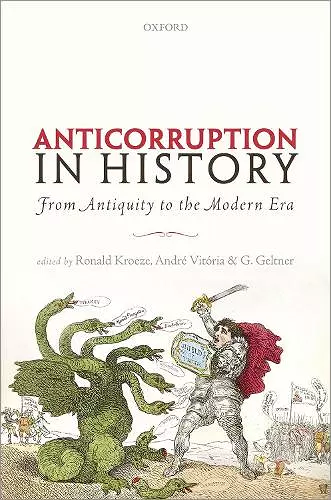Anticorruption in History
From Antiquity to the Modern Era
Ronald Kroeze editor André Vitória editor Guy Geltner editor
Format:Hardback
Publisher:Oxford University Press
Published:7th Dec '17
Currently unavailable, and unfortunately no date known when it will be back
This hardback is available in another edition too:
- Paperback£33.49(9780198858072)

Anticorruption in History is a timely and urgent book: corruption is widely seen today as a major problem we face as a global society, undermining trust in government and financial institutions, economic efficiency, the principle of equality before the law and human wellbeing in general. Corruption, in short, is a major hurdle on the "path to Denmark" a feted blueprint for stable and successful statebuilding. The resonance of this view explains why efforts to promote anticorruption policies have proliferated in recent years. But while the subject of corruption and anticorruption has captured the attention of politicians, scholars, NGOs and the global media, scant attention has been paid to the link between corruption and the change of anticorruption policies over time and place, with the attendant diversity in how to define, identify and address corruption. Economists, political scientists and policy-makers in particular have been generally content with tracing the differences between low-corruption and high-corruption countries in the present and enshrining them in all manner of rankings and indices. The long-term trends—social, political, economic, cultural—potentially undergirding the position of various countries plays a very small role. Such a historical approach could help explain major moments of change in the past as well as reasons for the success and failure of specific anticorruption policies and their relation to a country's image (of itself or as construed from outside) as being more or less corrupt. It is precisely this scholarly lacuna that the present volume intends to begin to fill. The book addresses a wide range of historical contexts: Ancient Greece and Rome, Medieval Eurasia, Italy, France, Great Britain and Portugal as well as studies on anticorruption in the Early Modern and Modern era in Romania, the Ottoman Empire, the Netherlands, Germany, Denmark, Sweden and the former German Democratic Republic.
a cohesive and stimulating investigation of the shifting perceptions of corruption in moral, civic and political terms and the strategies and alternative modes of public behaviour that have been attempted to deal with this ongoing problem of modern societies of all political hues. * Ian Cawood, English Historical Review *
The insights are many and readers will no doubt find their own amid this rich array of case studies; but arguably the greatest service performed by this book is to bring some much needed analytical pressure to bear on the divide between the modern, post-1800 era and that which went before. This is also where the book will be of most interest to historians and scholars of liberalism, which, however we might define it, is distinguished by a commitment to open and accountable government and the enactment of public office in a disinterested fashion, above the fray of financial, personal and political interests-at least in theory. * Tom Crook, Liberal History *
the merit of a work that has managed to gather such a large number of specialists working on such different periods in history. All the more so when the result is a fresh perspective on the study of corruption. * Pol Dalmau, European History Quarterly *
the analytical and conceptual rigour of the volume's chapters is high. This book provides a profound and rich historical analysis of a topical problem. * David De Ruysscher, BMGN - Low Countries Historical Review *
offers unique detail and insights ... Highly recommended. * Jay Albanese, CHOICE *
ISBN: 9780198809975
Dimensions: 242mm x 164mm x 34mm
Weight: 854g
464 pages